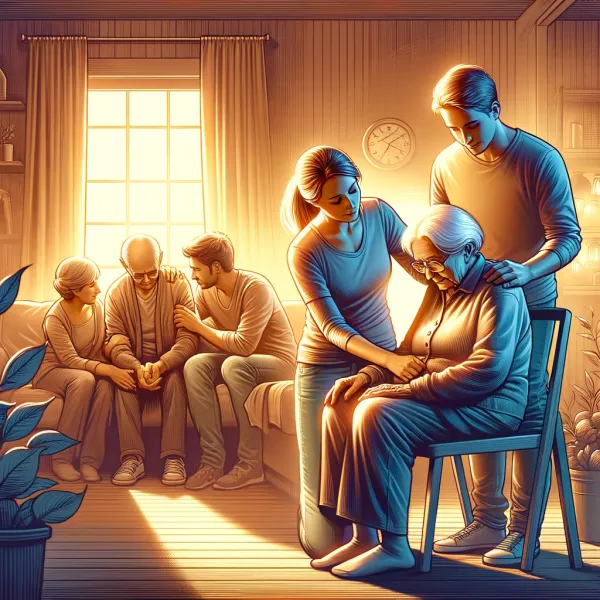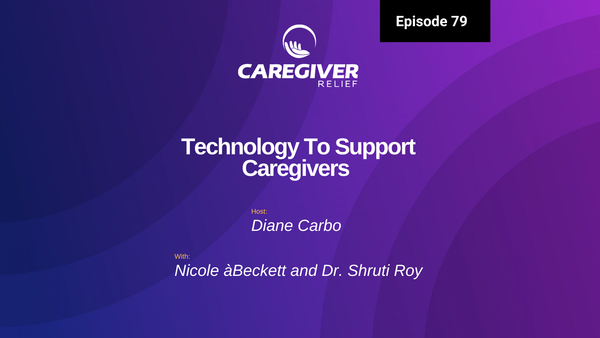The Importance of Building a Care Team Partner Support Group
Building a care team is crucial for successfully looking after an aging or ill loved one without burning out. Let us show you how to create a care team partner support group

Caregiving is not a solo journey. Just like raising children, it takes a village. That's why building a care team is crucial for successfully looking after an aging or ill loved one without burning out. While family members are an obvious source of support, we shouldn't stop there. Friends, neighbors, senior center buddies, and church groups can all be part of an unofficial care team. Many family caregivers are dealing with uninvolved siblings or extended family members. While they may not be willing to help with the hands on care of your care recipient, they can and should be able to provide practical assistance.
Even if someone isn't providing hands-on care, his or her involvement is still valuable. Asking for practical assistance is just as important. Having an extra set of eyes and ears focused on your loved one's well-being at home and in the community ensures their safety and gives you peace of mind.
Remember, supporting a family caregiver isn't just about offering emotional support – practical assistance is equally important in creating a strong caregiving system. Practical assistance entails providing tangible help and support to the caregiver. Tasks such as helping with daily chores, running errands, or even just being available for respite care.
Additionally, offering practical assistance can also include utilizing an online care management platform like Caregiver Relief. By using the platform to manage tasks and coordinate with other caregivers, you are providing practical help that can greatly reduce the burden on the primary caregiver and make their job much more manageable

Moreover, being a part of a care team partner support group also offers practical assistance by providing valuable resources and information that can help caregivers navigate through the challenges of caregiving. By sharing experiences and learning from each other, caregivers can gain practical knowledge and tips to improve their caregiving skills and techniques.
And let's not forget about other family caregivers. Connecting with them through support groups or online forums can provide valuable insights and support from those who truly understand the challenges of caregiving.
But what if family members aren't available or friends seem distant? Don't worry. We have your back. Caregiver Relief has created the How to Become a Patient Care Advocate course and manual. We teach you how to advocate for your family member, as well as how to build a team of advocates to support you and your care recipient. We can help you identify various ways to utilize the strengths of those long distant team members.
You can assign the task of finding resources for your care recipient. They can reach out to your local Area Agency on Aging (AAA) for assistance. They can connect you with resources and programs in your community, such as Meals on Wheels, caregiver support groups, and respite care. These resources can introduce you and your loved one to new people who can offer a helping hand in various ways.
You don't have to do everything alone. Embrace the power of community and ask for help. By joining forces with a care team partner support group, you can prevent burnout and ensure the health and well-being of your loved one. Don't let isolation be your burden when support is just a team effort away.
Building Your Care Team Partner Support Group: A Guide to Supporting Your Loved Ones
Is your caregiving journey becoming overwhelming? Are you feeling alone and unsure of where to turn for help? It's time to consider building a care team partner support group. Caregiving can be challenging, but with the right support system, you can navigate this journey with confidence.
First, let's start by identifying the key players who can join your care team:
Family members, including children: Your loved ones can provide emotional support and assistance.
Physicians: They can offer medical guidance and expertise.
Pharmacists: They can answer any questions about medications.
Medical professionals: Nurses, therapists, and other healthcare professionals can provide specialized care.
Clergy/Church members: They offer spiritual guidance and additional support.
Neighbors/Friends: They can help decrease social isolation and provide relief to caregivers.
Volunteers: They can offer their time and services to assist with various tasks.
Caregiver consultant/Social worker: They can provide resources, education, and act as a mediator.
Counselors/Therapists: They help with emotional needs and provide a fresh perspective.
Adult day program staff: They can offer respite and activity plans.
Home Care Providers: Certified professionals who can provide skilled care services.
Medical organizations: They offer information and support groups tailored to specific conditions.
Once you have identified potential team members, it's important to gather your family for a meeting. Caregiver Relief has created the Elder Care Communication Course. There is a lesson on how to have a productive family meeting.

Evaluate the situation together and discuss each person's strengths and abilities. Delegate specific responsibilities based on these strengths. Financial experts can offer guidance, legal professionals can help with important documents, and those with organizational skills can assist with tasks around the house. Even long-distance family members can contribute by providing moral support and arranging outside help.
Consider the dynamics within your family and address any potential challenges. Don't assume everyone is comfortable with certain tasks or responsibilities. By openly discussing concerns and finding common ground, you can prevent family disharmony and ensure everyone is on the same page.
Don't forget to seek support from professionals and your wider community. Consult with physicians, pharmacists, and clergy for their expertise and guidance. Reach out to friends, neighbors, and local organizations for assistance with social activities and respite care. Eldercare Case managers and caregiving coaches are available to you on Caregiver Relief. They can provide valuable resources, help you navigate the medical delivery system and provide emotional support. Home care agencies are available for skilled and custodial care services. And don't hesitate to contact relevant medical organizations for additional information and support.
Building a care team can be a game-changer for caregivers. By fostering strong communication, cooperation, and partnerships within your family and community, you can create a supportive network that will make your caregiving experience more successful.

Simplify and Organize Your Loved One's Care with Caregiver Relief’s Online Care Management Platform
Say goodbye to the chaos and confusion of managing your loved one's care. With Caregiver Relief, are online care management platform you can have everything you need in one centralized place. From personalized care recommendations to secure messaging and appointment tracking, we've got you covered.
Keep track of medications, appointments, and important documents with ease. Our online care management platform allows you to upload photos of medications for easy identification and automatically notifies everyone when there's a change. Plus, you'll have direct access to medical records so you can stay up to date on all doctor visits.
Invite your entire care team, including family members and professionals, to collaborate and stay on the same page. With role-based security, you have full control over who can access what information.
Forget about carrying around a bulky folder of medical records. With Caregiver Relief, you can securely store and access all your documents and photos whenever you need them. Of course, I recommend that you start a Home Health Care Notebook for each care recipient and one for yourself.
Don't wait until a crisis hits to get organized. Sign up for Caregiver Relief today and experience the ease and peace of mind that comes with our online care management platform.
Get the care you need, because everyone does. Whether it's a grandparent getting older or someone else in your family who depends on others for their daily needs, we're here to provide the support you need. Our dedicated caregiving system is ready to help you navigate and meet those needs with confidence.
As a family caregiver, it can often feel overwhelming to take on the role of being the sole provider of care for your loved one. Not only do you have to navigate their physical and emotional needs, but also juggle your own personal responsibilities. This is where building a care team comes in.
Building a Care Team Partner Support Group
The first step to building a strong caregiving system is to build a care team. This involves identifying and recruiting family members, friends, or professionals who can help provide support and assistance for your loved one. It's important to involve your loved one in the decision-making process as much as possible, ensuring they feel included and valued.
Having multiple caregivers allows you to divide up responsibilities and tasks, making it more manageable for everyone involved. Each caregiver can bring their unique skills and strengths to the team, creating a well-rounded care plan that caters to your loved one's specific needs.

Benefits of an Online Care Management Platform
In addition to building a physical care team, utilizing an online care management platform like Caregiver Relief can greatly benefit family caregivers. With its user-friendly interface, the platform allows caregivers to easily manage and organize their loved one's care from anywhere, at any time.
One of the major benefits of using an online platform is the ability to coordinate with other caregivers in real-time. By keeping everyone on the same page and sharing caregiving tasks, it reduces the chances of miscommunication and misunderstandings.
The platform also offers a comprehensive range of resources, including educational materials, support groups, and access to professional care managers. This can greatly decrease the stress of caregiving and provide valuable support for both the caregivers and their loved ones.
Partner Support Group
In addition to building a care team and utilizing an online platform, it's also important for family caregivers to have emotional support throughout their journey. Partnering with other caregivers who are going through a similar experience can provide a sense of community, understanding, and validation.
Caregiver support groups not only offer an outlet for venting frustrations and sharing experiences, but they also provide valuable information and resources. It's a safe space where caregivers can learn from each other, receive emotional support, and find comfort in knowing they are not alone on this journey. To learn more Check out the How to Become a Patient Care Advocate Course and manual.
Building a care team, utilizing an online care management platform like Caregiver Relief, and joining a partner support group are all crucial steps in creating the best caregiving system for family caregivers. These measures can greatly decrease stress and make the caregiving journey more manageable, allowing caregivers to provide the best possible care for their loved ones without sacrificing their own well-being.
Remember, you don't have to do it all alone – there is a community of support waiting for you. So why not take that first step today and start building your caregiving team? Your loved one and your own well being will thank you. So, let's work together to ensure that our aging family members receive the best care possible and that their caregivers feel supported every step of the way. Let's build a strong caregiving system, one team at a time.





